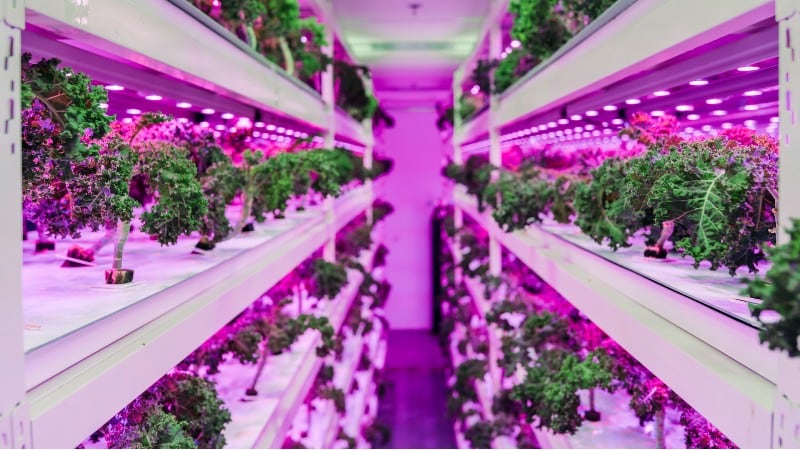Sustenir has built indoor vertical farming infrastructure using hydroponics technology and a controlled environment agriculture (CEA) system.
“The infrastructure allows us to ‘grow more with less’. We are able to grow a good quantity of fresh produce with less space and water, and without the use of pesticides, right in the heart of supercities,” Jack Moy, CEO of Sustenir Group, told FoodNavigator-Asia.
Sustenir’s farm in Singapore measures less than 4,000 square metres, and has an output of approximately one tonne a day.
The bulk of its produce are superfoods, including kale, spinach and arugula.
“We started as a grower that wanted to reinvent the food value chain. Now, we are looking deeper at how our produce can benefit consumers not only in terms of enhancing food resilience, but also their health,” Moy added.
For example, the firm said kale contains gamma-aminobutyric acid (GABA), an amino acid neurotransmitter naturally produced in the gut. It is known to have a calming effect on both the brain and body, and can be fortified through food.
It then reinforced its Toscano kale crops with higher levels of GABA through a combination of seed curation and CEA. This marks the company’s first foray into precision agriculture.
“Many people use GABA supplements to relieve anxiety and improve sleep. But isn’t it amazing if people could take in GABA via vegetables, instead of pills?” said Moy.
This also galvanised Sustenir’s research partnership with precision gut microbiome company AMILI (Asian Microbiome Library) to study the effects of GABA-laden vegetables on the gut microbiome.
“The insights from AMILI will help us better understand our produce. We also hope to learn more about the gut microbiome of consumers in different cities, their unmet needs, and potential new crops we can grow to provide a natural solution,” Moy explained.
Precision agriculture comes into play
Sustenir’s innovations are largely demand-driven, based on feedback obtained from on-ground engagement and consumer research. One of the things that the company observed in Singaporean consumers is the preference for a less bitter taste profile.
“Precision agriculture is about getting the desired output and quality by controlling the inputs. This control is enabled by technology or crop science. To tailor the crop the way consumers want — less bitter and a crispier texture — there are multiple levers we can pull. It’s a mixture of getting the right seed variety, and providing the right amount of water content and crop nutrients,” Moy explained.
The seeds used by Sustenir are mainly imported from The Netherlands, although the company has started working with Japanese partners to source for high-quality seeds.
“We are just scratching the surface of precision agriculture. There have been significant improvements in this space — for example, better LED lighting and climate control systems. At the same time, there are more suppliers who are customising seeds for indoor farming. In the past, we could only buy seeds that are meant for outdoor cultivation.
“There is still a huge potential for development. We are looking beyond controlling the environment and quality of crops. As the industry progresses, we could even move from mass customisation to personalised nutrition,” said Moy.
Room for growth
Headquartered in Singapore, Sustenir also operates farms in Kuala Lumpur and Hong Kong. Most produce are sold in major retail supermarkets and e-commerce platforms across all three markets.
While there are plans to extend its footprint into the foodservice sector, Sustenir’s priority is to build a stronger demand for healthy leafy greens.
“Reports have showed that Singaporeans only eat 40 grams of leafy greens per day, as opposed to the minimum of 200 grams recommended by the Health Promotion Board,” said Moy.
In addition, Sustenir will focus on scaling up in its existing markets, including a bigger farm in Kuala Lumpur.
The firm believes its model can be replicated in other cities, such as Jakarta and Bangkok. However, Moy pointed out that agriculture remains a ‘sensitive industry’ to navigate, as many cities are ‘still coming to grips’ on the regulation of vertical farms.
Nevertheless, the trend of ‘growing in the city for the city’ is expected to press ahead, with vertical farms playing a useful part in bolstering local food security.
“Following our certification as a B Corp company in 2022, we want to continue expanding our portfolio and to solidify Sustenir’s position as a superfoods firm. We also welcome more talents to join us in the growing agritech space,” Moy concluded.


